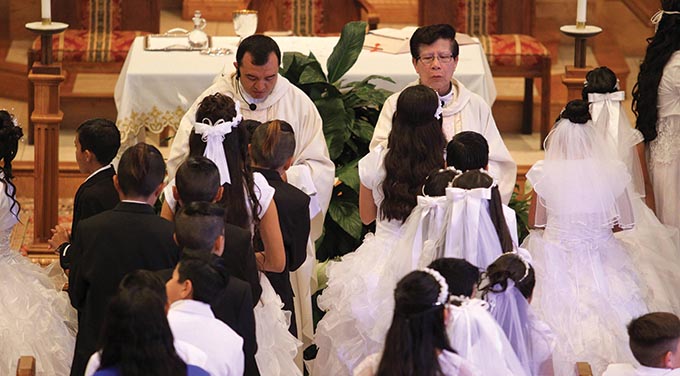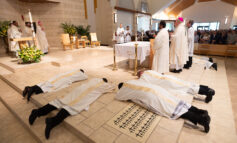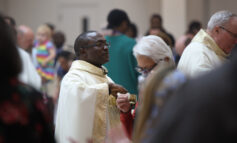
Father Luis Sierra, left, and Father Joseph Nguyen give Communion during a first Holy Communion Mass at Immaculate Conception Catholic Church in Grand Prairie on May 6. (KEVIN BARTRAM/Special Contributor)
By Father John Bayer
Special to The Texas Catholic
I am convinced Catholics have an important gift to give to the world through the “social teaching” developing in the Church since Rerum Novarum in 1891. But even though all the popes between Leo XIII and Francis have put the economic, political and social impact of the Gospel at the forefront of their agendas, the world is still thirsting for this teaching. Obstacles have emerged to its communication: few are aware it even exists; some who are aware dismiss it as pious musings irrelevant to the “science” of politics and economics; and some who admire it appeal to it only selectively, and thus tend to discredit its coherence and credibility.
Overcoming the second obstacle — or the one which says that “Catholic Social Teaching” (CST) is basically irrelevant — requires an intellectual conversion. Our tendency is to treat economics as an abstract science that has little to do with theological or philosophical values; and so, our temptation is to set allegedly inexorable “laws” —like supply and demand, for example — as the highest principles governing economic decisions. Jesus tells us to integrate the economy into a deeper vision of reality, where it serves rather than rules. In response, we throw our hands in the air and protest that trying to control markets is like trying to control gravity.
Of course, we should discern whether people are demanding what we can supply; otherwise, we are going to waste time and resources. But is this the highest law of production? Should it not be integrated into a deeper reflection about what should be produced and how? It must be integrated, for sometimes we must refuse to supply what is being demanded, and even teach people to demand what we supply, even if it means we make a smaller profit. Why? Well, for the simple reason that things like pornography, drugs, soul-numbing entertainment and weapons of mass destruction destroy life and contradict the truth, even when they are demanded. And things like education, cultural achievement and moral development are not always in high demand, even when we have the means to supply them. If our goal is to flourish, then we should observe the “law” of supply and demand (or any other) only within a more comprehensive vision of reality – otherwise we will produce only whatever is easiest to sell, and likely fill our world with waste and destruction.
I once stayed at a monastery which I think subordinates its economy to its life in a sensible way. These nuns began their life together some 60 years ago in great poverty. Despite several difficulties, they survived financially by farming. Today, they run a busy guesthouse and about 30 acres of land; and they make enough cheese, marmalade and other products to cover all their living and operational expenses. They rely on donors (or “external capital”) only to make major investments into their buildings (and they are, in fact, preparing to appeal to donors to expand their buildings to accommodate new vocations, and to improve their guesthouse and farm).
At one point, the nuns asked some economists to suggest ways to make more money. They were told to specialize: to work on only one stage in the production of one good in order to increase efficiency and profits.
Today, they work on many stages in the production of many goods, because they find fulfillment in witnessing the entire life-cycle from seed to harvest, and in creatively turning raw materials into finished products. Because the nuns feared that hyper-specialization would lead to monotony and a loss of spiritual value, they refused the economists’ advice. It is more profitable to buy saplings rather than manage a greenhouse, and to buy new cows rather than birth them. But as one sister said, “We need to see life coming into the world.” I was moved when she said that, and I wondered to myself: How much would it cost to resupply that fulfillment after having lost it to make more money? If you have enough money to live, why sacrifice your happiness only to make more?
I think this wisdom transcends our contemporary political discourse. To secure themselves, these nuns did not just create new and more demanding laws. They created an economy. But they did so by submitting their economic freedom to a deeper vision of reality, and by finding the love necessary to live humbly and happily. A healthy economy is not necessarily the one that is most profitable; but it is always the one that serves the community. This is one lesson the social teaching of the Church can give to the world.
Father John Bayer, O.Cist., is a theologian and monk at the Cistercian Abbey of Our Lady of Dallas in Irving. His column appears occasionally in The Texas Catholic.



